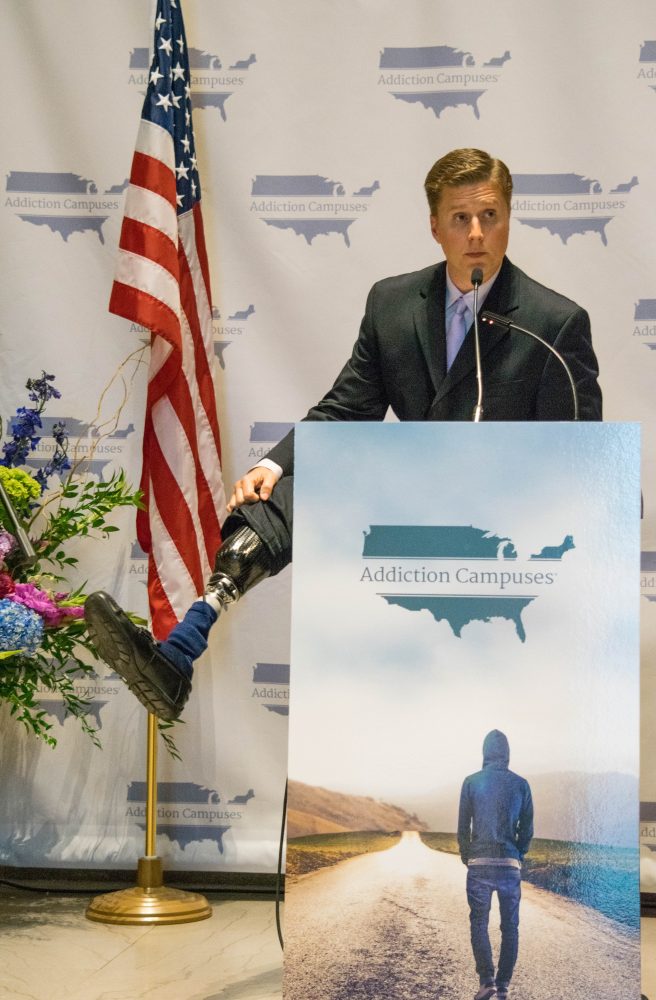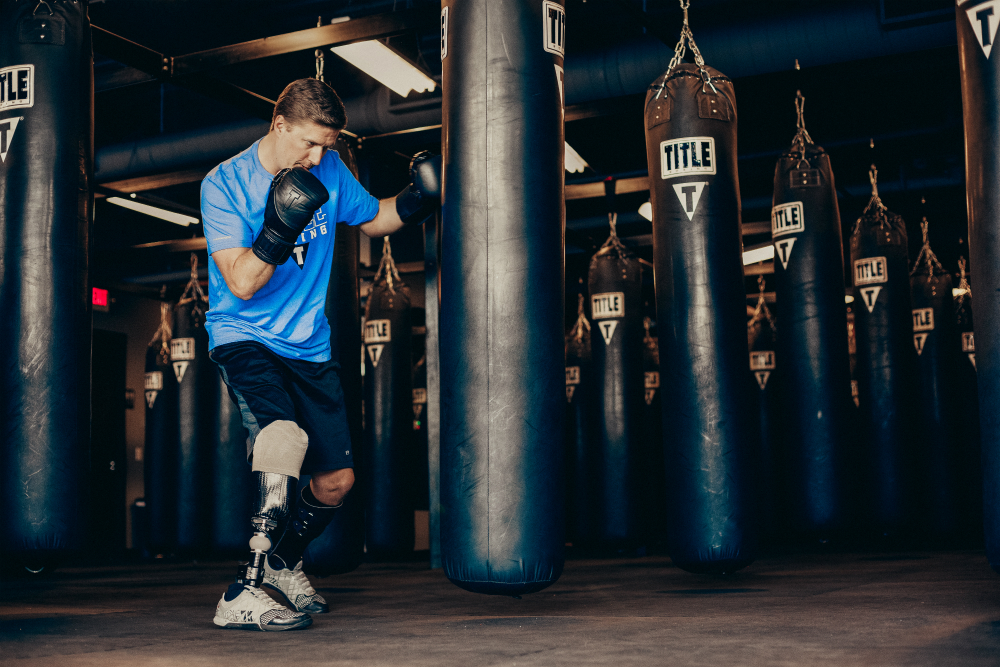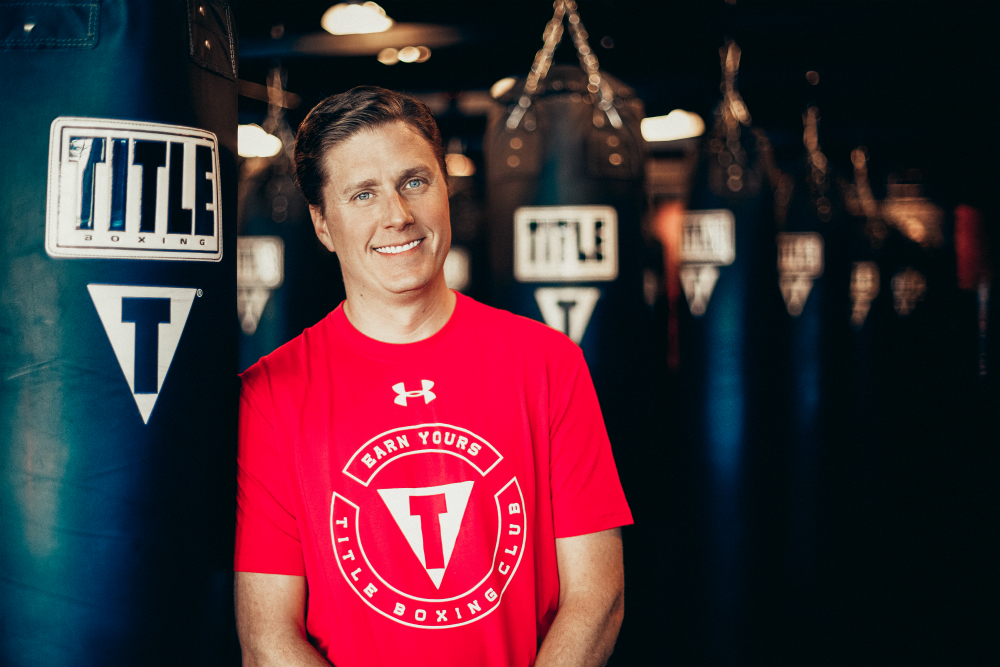Finding yourself can be a lifelong journey. Along the way individuals experience the full gambit of emotions. Happiness, depression, joy, loneliness, success and failure.
For John Mabry, 40, the saying “fall down seven times get up eight” couldn’t be any more realistic. As his battles with tragedy, addiction and physical disability have not only shaped his life, but have uncovered an inner strength larger than he could ever imagine.
It all started on March 11th, 2000 when Mabry was a 23-year old senior attending Baylor University on a full-ride scholarship with Baylor Athletic Video. He was returning from spring break with three friends when tragedy struck just outside Houston, Texas.
One of the tires on the vehicle exploded, propelling the car to roll 8-to-10 times. When the car finally came to a stop, Mabry’s right leg was completely crushed and one of the passengers was fatally injured.
After 14 surgeries Mabry opted to have his leg amputated below the knee in an effort to alleviate his pain and gain some type of quality of life back. Six weeks after his amputation, he walked across the stage at Baylor’s graduation. Mabry wanted to walk at graduation because he wanted people to think he was strong and to help them be strong as well.
But it was all for show, as Mabry was covering up an emotional pain that would only intensify over the next 17 years.
“In one year, I went from feeling on top of the world to distraught and terrified,” Mabry said. “I felt defective, broken and defeated. I would think to myself “Am I a freak?”. And that’s when I turned to painkillers and alcohol.”
In 2002 Mabry moved from Texas to San Diego to pursue a Master’s degree in Rehabilitation Counseling at San Diego State University. While attending graduate school, he continued to date his girlfriend from Baylor, Sarah, who eventually became his wife and mother of his three children.

But despite the positive things happening in his life, Mabry was still secretly abusing drugs. As Mabry’s addiction to drugs only became stronger, so did his anxiety centered around getting caught and labeled as an addict.
In 2005, he completed the Master’s program at San Diego State. And with no plans on the horizon, Mabry took advantage of an opportunity to do get involved in acting with his cousin. Mabry and his wife moved to Los Angeles as he found success in productions such as ER, Superbad and NCIS.
And just as his career seemed to be taking off, Mabry would hit his low point after finding his brother who had died of an accidental overdose in 2008.
“Addiction is a deadly disease that people are afraid to discuss,” Mabry said. “My brother didn’t die from an overdose he died from the stigma of addiction. And even though I was so close to it at the time, I didn’t see how my situation was similar to his. I went deeper into my addiction as a result.”
Mabry and his family decided to move away from Hollywood in 2009, settling down in Nashville where Mabry started working for a Christian radio show. It was at this point that Mabry thought he had everyone fooled, that is until he was fired in 2011 due to his drug addictions.
“It didn’t matter what my job was. My addictions were destroying me,” Mabry said. “I realized that I was going to die like my brother if I didn’t ask for help.”
When Mabry went to treatment he didn’t tell anyone. He didn’t want people to think that he was “dirty” or just like “a guy on the streets”. He was afraid of the perception and the stigma of addiction.
His fear led to three years of failed treatment. But in 2015 Mabry would knockout drug addiction while at Addiction Campuses’ Treehouse facility near Dallas, Texas.
“It was a game changer. There was a deeper level of compassion from the people and staff at Addiction Campuses,” Mabry said. “They were true to their mission statement and created an environment that didn’t create that ‘treatment mentality’”.

Mabry’s treatment at Addiction Campuses, who has a nationwide network of treatment facilities, would be his last. Finally ending his 14-year battle with addiction. While at treatment, he also found a new passion that aided him with stress, anxiety and more.
“There was this punching bag and a pair of gloves,” Mabry said. “I had never boxed before but after I did, it changed everything. It just lit this fire inside of me that allowed feelings that were bottled up for over a decade to come out.”
The feeling that Mabry discovered at the bag was something he knew he needed in his life. So, in December of 2015 Mabry became a member at TITLE Boxing Club Franklin Cool Springs outside of Nashville.
“Boxing was the magical pill I always needed. It was medication that I’d never had before,” Mabry said. “It’s been one of the biggest positive impacts in my recovery from addiction.”

Mabry credits the staff, trainers and members at TITLE Boxing Club Cool Springs for creating such an incredible community atmosphere. Mabry consistently takes about 4-to-5 classes a week, mixing-in freestyle combinations alongside what he considers to be his extended family.
Boxing has helped Mabry save money on therapy, it has also helped him spend less on medications. But the best part about becoming part of the TITLE Boxing Club family has been the ability to help others.
“Everyone comes into the club with different mental blocks or limitations,” Mabry said. “I hope people understand that they have the same strength inside them that I do. Just because my disability is visible, it doesn’t mean that I’m any different.
We all have disabling events in our lives. TITLE Boxing Club is a great community to overcome our perceived disabilities together.”
In the spirit of helping others Mabry continued his involvement with Addiction Campuses. He also hosts the company’s podcast titled ‘High Sobriety’, which focuses on addiction trauma, rehab and recovery. The podcast features high-profile celebrities and guests teaming up to save lives and tackle the stigma of addiction.
Mabry also is a board member for a non-profit organization founded by fellow TITLE Boxing Club Cool Springs member Aspen Luzier. Her organization, Rebel For a Change, is built to provide support for millions of peoples and their families that are struggling with addiction.

Almost 18 years ago Mabry walked across that stage at Baylor’s graduation in an effort to be strong for others, not himself. Now he has the courage to be strong for all – especially himself.
Thank you for showing the world your strength John.
